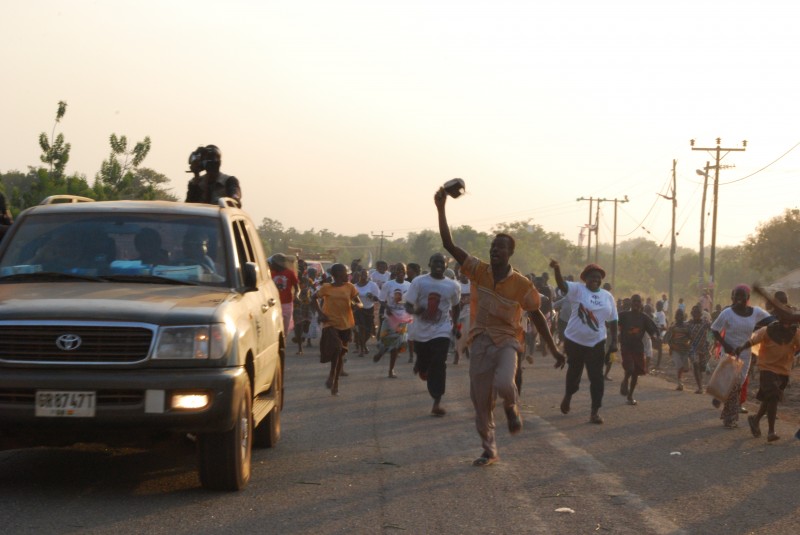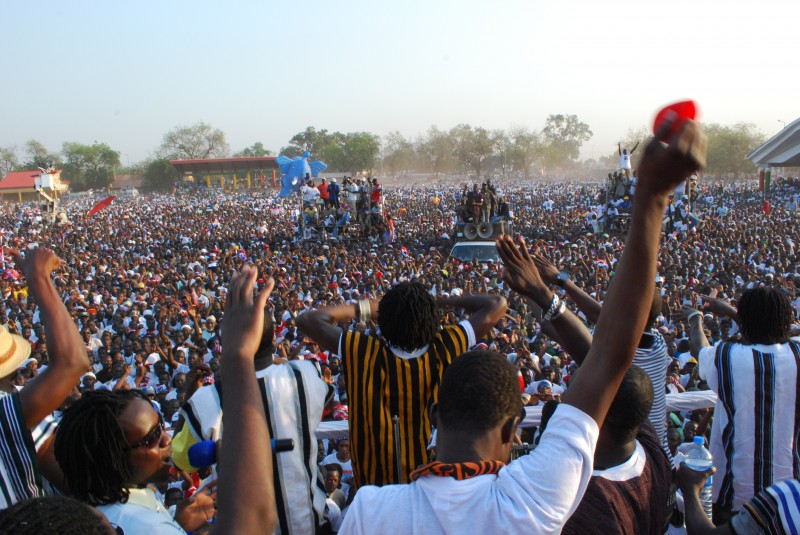An African Election | reviews, news & interviews
An African Election
An African Election
On the campaign trail in Ghana's emblematic 2008 trip to the polls
How much do you remember about the Ghanaian presidential run-off of 2008? Me neither. And there's a reason for that. The Swiss documentary-maker Jarreth Merz spent three hectic months on the campaign trail, the better that we might understand – and he's put it all down in An African Election.
In little over 50 years since Kwame Nkrumah's groundbreaking election as Africa's first black prime minister, Ghana has been through five military dictatorships and four republics. The most notable figure in all this chequered history is Flight Lieutenant Jerry John Rawlings, who seized power in 1979, executed his predecessors in what he openly termed "house cleaning", returned government to the people within months, then took it back in disgust two years later when he saw what they did with it. By the lights of African military dictators Rawlings ran a pretty decent show; and in 1992 (under international pressure, admittedly) he took the leash off Ghana's democratic process and held legitimate elections – which he won. Twice. In 2000, at the end of his second term (a limit imposed by the constitution he himself had signed into law), Rawlings handed over power to John Kufuor's New Patriotic Party – the first and only time Ghana had witnessed a peaceful transition from one ruling party to the next. Would it ever happen again?
A cheery narrative conclusion leaves the film looking dangerously like it has oversold its main premises
Like all good political stories, Ghana’s has at least two and a half sides. Additionally, Merz is keen to frame the electoral process against the background of post-election violence in Kenya and Zimbabwe (to name just two) and the recent discovery of oil in Ghanaian territorial waters, which those of a cynical bent would say raises the stakes when it comes to control of the national purse.
Although there were 15 candidates in total, this was essentially a two-horse race: for the NPP, Nana Akufo-Addo, former Minister of Justice and Minister of Foreign Affairs under Kufuor; for Rawlings’s party (the National Democratic Congress), Professor John Atta Mills, Rawlings’s former VP.
Thanks to the natural characters of the loud-mouths and braggarts who populate presidential politics, Merz has no trouble getting access to key players. Predictably enough, the policy wonks and journalists (all Ghanaian) bang on about "good governance" and "due process" and the like, while the politicians – who actually have to get elected – talk about "peace" and "the people", "increased production", "education for all", "bringing technology to Ghana", "going forward". You're never quite sure when this is just code for "our turn at the trough, thanks".

In the end – after a hung first round, a second-round run-off, contested results, angry rhetoric, and yes, the army on the streets – the election is decided, thanks to the shepherding of the imperturbable election commissioner, Dr Afari-Gyan, by the constituents of the rather small and far-flung Tain District, who had, due to an administrative glitch, been unable to finish voting in the second round. Cue curious footage of villagers stepping over their goats to decide the nation's future, and all’s well that ends with a new president.
This is a cheery narrative conclusion, but it leaves the film looking dangerously like it has sexed up and oversold its main premises. First, that there might be a brutal post-election scrum over power and oil wealth (when it turns out that Ghanaian politics is, now anyway, after five consecutive “free and fair” elections, really very much like our own). Second, the persistent and ill-argued notion that Ghana is somehow Africa's political barometer (hence the concern, if its democratic processes go up in smoke once again). In fact, the latter starts to look downright paradoxical if Ghana could have gone the way of Zimbabwe and yet doesn't because they have the more mature democratic system.
 Nor is there discussion of why democracy has struggled across Africa as a whole (and no: the answer isn't “the CIA”), or – a related topic – the oft-lamented love of the Big Man in African politics. This is fundamental to the Rawlings phenomenon, and although Merz gives Rawlings more than enough rope to hang himself, the footage of him is so extended (presumably because he was the most keen to talk) that it hints at a kind of journalistic Stockholm syndrome.
Nor is there discussion of why democracy has struggled across Africa as a whole (and no: the answer isn't “the CIA”), or – a related topic – the oft-lamented love of the Big Man in African politics. This is fundamental to the Rawlings phenomenon, and although Merz gives Rawlings more than enough rope to hang himself, the footage of him is so extended (presumably because he was the most keen to talk) that it hints at a kind of journalistic Stockholm syndrome.
In short, we don’t hear enough from the people whom the politicians claim to represent. "What should politicians do to make the country better?" one farmer is asked in a rare vox pop. Simple, he says: “If only they stopped to tell lies.” Putting a camera in front of them weeks before an election doesn’t seem the best way to wean them off the habit. That said, An African Election does a good job of keeping the story moving, a tough one for documentaries when you already know what's happened (if all you know is that Ghana didn't implode), and the quietly emergent hero is – and I mean this sincerely – the democratic process itself. A peaceful handover of power from one elected party to another is a tragically rare occurrence in Africa, and this one is to be celebrated.
- An African Election is released on Friday in selected cinemas
Watch the trailer for An African Election
Add comment
The future of Arts Journalism
You can stop theartsdesk.com closing!
We urgently need financing to survive. Our fundraising drive has thus far raised £49,000 but we need to reach £100,000 or we will be forced to close. Please contribute here: https://gofund.me/c3f6033d
And if you can forward this information to anyone who might assist, we’d be grateful.

Subscribe to theartsdesk.com
Thank you for continuing to read our work on theartsdesk.com. For unlimited access to every article in its entirety, including our archive of more than 15,000 pieces, we're asking for £5 per month or £40 per year. We feel it's a very good deal, and hope you do too.
To take a subscription now simply click here.
And if you're looking for that extra gift for a friend or family member, why not treat them to a theartsdesk.com gift subscription?
more Film
 The Perfect Neighbor, Netflix review - Florida found-footage documentary is a harrowing watch
Sundance winner chronicles a death that should have been prevented
The Perfect Neighbor, Netflix review - Florida found-footage documentary is a harrowing watch
Sundance winner chronicles a death that should have been prevented
 Blu-ray: Le Quai des Brumes
Love twinkles in the gloom of Marcel Carné’s fogbound French poetic realist classic
Blu-ray: Le Quai des Brumes
Love twinkles in the gloom of Marcel Carné’s fogbound French poetic realist classic
 Frankenstein review - the Prometheus of the charnel house
Guillermo del Toro is fitfully inspired, but often lost in long-held ambitions
Frankenstein review - the Prometheus of the charnel house
Guillermo del Toro is fitfully inspired, but often lost in long-held ambitions
 London Film Festival 2025 - a Korean masterclass in black comedy and a Camus classic effectively realised
New films from Park Chan-wook, Gianfranco Rosi, François Ozon, Ildikó Enyedi and more
London Film Festival 2025 - a Korean masterclass in black comedy and a Camus classic effectively realised
New films from Park Chan-wook, Gianfranco Rosi, François Ozon, Ildikó Enyedi and more
 After the Hunt review - muddled #MeToo provocation
Julia Roberts excels despite misfiring drama
After the Hunt review - muddled #MeToo provocation
Julia Roberts excels despite misfiring drama
 London Film Festival 2025 - Bradley Cooper channels John Bishop, the Boss goes to Nebraska, and a French pandemic
... not to mention Kristen Stewart's directing debut and a punchy prison drama
London Film Festival 2025 - Bradley Cooper channels John Bishop, the Boss goes to Nebraska, and a French pandemic
... not to mention Kristen Stewart's directing debut and a punchy prison drama
 Ballad of a Small Player review - Colin Farrell's all in as a gambler down on his luck
Conclave director Edward Berger swaps the Vatican for Asia's sin city
Ballad of a Small Player review - Colin Farrell's all in as a gambler down on his luck
Conclave director Edward Berger swaps the Vatican for Asia's sin city
 London Film Festival 2025 - from paranoia in Brazil and Iran, to light relief in New York and Tuscany
'Jay Kelly' disappoints, 'It Was Just an Accident' doesn't
London Film Festival 2025 - from paranoia in Brazil and Iran, to light relief in New York and Tuscany
'Jay Kelly' disappoints, 'It Was Just an Accident' doesn't
 Iron Ladies review - working-class heroines of the Miners' Strike
Documentary salutes the staunch women who fought Thatcher's pit closures
Iron Ladies review - working-class heroines of the Miners' Strike
Documentary salutes the staunch women who fought Thatcher's pit closures
 Blu-ray: The Man in the White Suit
Ealing Studios' prescient black comedy, as sharp as ever
Blu-ray: The Man in the White Suit
Ealing Studios' prescient black comedy, as sharp as ever
 The Woman in Cabin 10 review - Scandi noir meets Agatha Christie on a superyacht
Reason goes overboard on a seagoing mystery thriller
The Woman in Cabin 10 review - Scandi noir meets Agatha Christie on a superyacht
Reason goes overboard on a seagoing mystery thriller
 London Film Festival 2025 - crime, punishment, pop stars and shrinks
Daniel Craig investigates, Jodie Foster speaks French and Colin Farrell has a gambling habit
London Film Festival 2025 - crime, punishment, pop stars and shrinks
Daniel Craig investigates, Jodie Foster speaks French and Colin Farrell has a gambling habit

Comments
Is this already out for sale?
Is this already out for sale? Where can one purchase the DVD?
plz i will like to knwo where